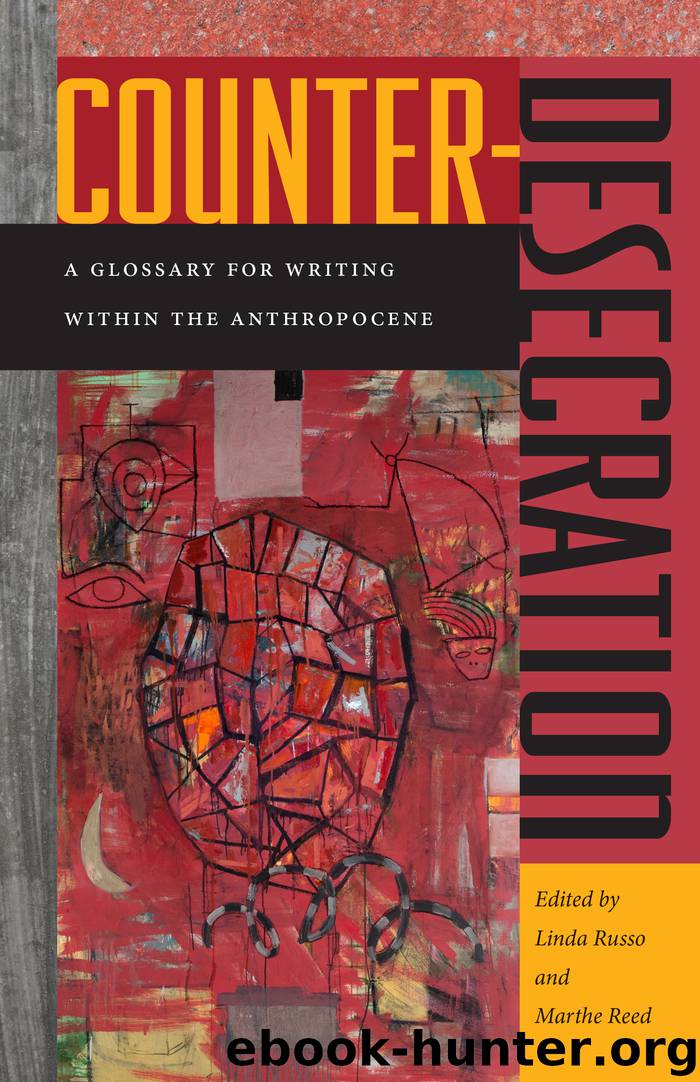Counter-Desecration by Unknown

Author:Unknown
Language: eng
Format: epub
Publisher: Wesleyan University Press
Published: 2018-03-21T16:00:00+00:00
MARTHE REED
“SOMEWHERE INBETWEEN”
Speaking-Through Contiguity
A glowing eel in the darkness—anguish.
He clacks the beads, how to live, where to go.
Arthur Sze | “Strike-Slip”
“Life is not just networked; it is network,”1 biologist David George Haskell observes, yet where in that network does the human fit? Decoder? Recoder? Master? Our species has a long, troubled history with the illusion of mastery. The spiraling causes and consequences of ecological crisis—climate change, rising sea levels, toxic landfills, poisoned water and neighborhoods, collapsing fisheries, destroyed communities—lies within a lie, or a rather, a conceit: a false dichotomy separating humankind from all other constituent elements of the living world. Human and Nature, distinct and isolate, resonate in polar opposition, leaving humankind unresponsive to our complexly interpenetrated condition: imaging ourselves cut off while deep in the midst.
Timothy Morton, in Ecology without Nature, reframes the human/other-than-human relation as “drastically collective,” to emphasize the environment as a site of political imperative: “All kinds of beings, from toxic waste to sea snails, are clamoring for our scientific, political, and artistic attention, and have become part of political life.”2 Escape from this truth lies through no doorway, no slippery construct of language or argument: “we” are “it,” inextricable from our circumstances. The point on which all else turns: within this “drastically collective” condition, how, then, as Arthur Sze asks, live? Indeed, how write?
Bound up in rhetorics of power, misunderstanding, and misinformation (“alternative facts,” climate change denial, the profit motive’s corrupting influence), language is the material of contracts, legislation, treaties, judgments, and policy, for good or ill, as well as the primary means by which writers work. Perhaps the most urgent demand on our language right now is to afford a requisite shift of understanding and action: reframing/imagining ways of seeing, inhabiting, and expressing our relation to energy, mobility, (re)production, and community. Morton, in substituting ecological writing for “ecomimesis”—more colloquially termed “nature writing”—articulates a critical distinction. Ecomimesis holds that “nature” might be captured on the page through description and ambience without redress to the conceptual underpinnings of the idea of “nature” itself, the reproduction of which turns on the perception that the human species is separate from nature. Ecological writing, by contrast, situates the writer within: contiguous, interpenetrated, vulnerable. One salutary movement in that direction, drawing on the heterogeneous, multilayered environment in which language currently operates, are the AltEPA, AltNASA, and other Twitter handles and feeds adopted in response to Trump administration efforts to censor climate science on national websites. When language slides sideways through the radically collective and interpenetrated internet, space is held open for the formerly silenced: a social, political, activist language-practice of resistance. These activists assert an ecological imperative, inspiring writers to engage in similar acts of language/political resistance. Indeed, the environmental peril of the Anthropocene demands that writers act ecologically, directly engaging with the histories, traditions, and foundational beliefs to which we are heirs, not mere cataloguers of beauty or loss.
In order to pursue a new practice of language, consider some of the bases for our current condition, first and foremost the exhausted trope “Nature.
Download
This site does not store any files on its server. We only index and link to content provided by other sites. Please contact the content providers to delete copyright contents if any and email us, we'll remove relevant links or contents immediately.
The Universe of Us by Lang Leav(15072)
The Sun and Her Flowers by Rupi Kaur(14511)
Adultolescence by Gabbie Hanna(8923)
Whiskey Words & a Shovel II by r.h. Sin(8009)
Love Her Wild by Atticus(7753)
Smoke & Mirrors by Michael Faudet(6185)
Wiseguy by Nicholas Pileggi(5772)
The Princess Saves Herself in This One by Amanda Lovelace(4973)
Love & Misadventure by Lang Leav(4843)
Memories by Lang Leav(4797)
Milk and Honey by Rupi Kaur(4743)
Bluets by Maggie Nelson(4548)
Too Much and Not the Mood by Durga Chew-Bose(4339)
Pillow Thoughts by Courtney Peppernell(4274)
Good morning to Goodnight by Eleni Kaur(4232)
The Poetry of Pablo Neruda by Pablo Neruda(4099)
Algedonic by r.h. Sin(4057)
HER II by Pierre Alex Jeanty(3606)
Stuff I've Been Feeling Lately by Alicia Cook(3452)
